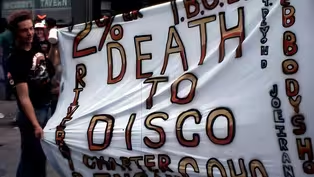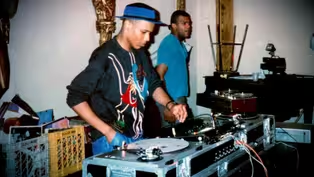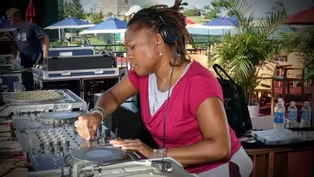Chicago Stories
From the WTTW Archives: An Interview with Frankie Knuckles
Clip: 11/8/2024 | 3m 27sVideo has Closed Captions
DJ Frankie Knuckles discusses the early days of house music at the Warehouse in this 2004 interview.
DJ Frankie Knuckles discusses the early days of house music at the Warehouse in this 2004 interview from the WTTW Archives.
Problems playing video? | Closed Captioning Feedback
Problems playing video? | Closed Captioning Feedback
Chicago Stories is a local public television program presented by WTTW
Lead support for CHICAGO STORIES is provided by The Negaunee Foundation. Major support is provided by the Abra Prentice Foundation, Inc. and the TAWANI Foundation.
Chicago Stories
From the WTTW Archives: An Interview with Frankie Knuckles
Clip: 11/8/2024 | 3m 27sVideo has Closed Captions
DJ Frankie Knuckles discusses the early days of house music at the Warehouse in this 2004 interview from the WTTW Archives.
Problems playing video? | Closed Captioning Feedback
How to Watch Chicago Stories
Chicago Stories is available to stream on pbs.org and the free PBS App, available on iPhone, Apple TV, Android TV, Android smartphones, Amazon Fire TV, Amazon Fire Tablet, Roku, Samsung Smart TV, and Vizio.
Providing Support for PBS.org
Learn Moreabout PBS online sponsorship- The Warehouse was, it was actually a private membership club.
It was really to a certain degree back then, a glorified house party, private party.
I lived in the space for like two years.
When I first moved here from New York.
We concentrated, I mean, it was all about every Saturday night.
So we'd spend six days out of the week preparing for one night, and that's what it was about.
And it was about the people and what they brought to it.
The people were lots of young, mostly black, mostly gay, not all gay, but I would say probably at least a good 70, maybe 80% professionals, people, college kids, you know, like I said before with goals and you know, ideas and dreams that they were trying to achieve.
But it was a place of release, you know, the stress of, you know, I guess just growing up, you know, at home and, and, and school and the jobs they had.
It was my theory back then.
It was pretty much the poor man's resort, so to speak, within the city, because people could come there and they can close their eyes, listen to the music and dance all night long, and just completely escape from reality.
It was described as church on many occasions, because one, it was Saturday night, we opened the doors at midnight and we probably wouldn't close it until like noon or one o'clock the next day.
And it was a very spiritual experience.
It wasn't a religious experience, it was more of a spiritual one.
So people would, throughout the course of the night from the music I was playing, people would run a whole gamut of emotions, you know, from being very happy to very sad and crying and everything.
I mean, that's what the music and the sound would do to them.
So I guess it's kind of like church, you know, you're sitting in a church, you know, and the pastor is giving you just the right sermon that it takes you from one extreme to the next and you walk out feeling good.
That's pretty much what The Warehouse did.
Do we think we were making history?
Absolutely not.
We were just busy having a good time.
You know, everyone likes to be a part of some kind of club or something that they feel is elite, you know?
And even though The Warehouse was a very small place, it was a very small building on, on the South Side here, that really was very insignificant.
It was very unassuming.
You could've passed by 50 million times and never knew it was there, you know, came alive one day out of the week, you know?
And the people that were part of that were really, really special and they felt special, you know?
And we didn't really do anything out of the ordinary other than dress the place up and make it look cute and serve them food and beverages and keep them refreshed, all evening, you know?
And just lots and lots of music.
And that kept people connected, you know, after dealing with such a, you know, a hard week of work and school and whatever it is they had to go through, you know, it was a great place for them to come and just completely let go.
And it's nice to be able to go someplace where, you know, where you almost like, you feel like you're in your bedroom and nobody's watching.
You're dancing like nobody's watching you.
Well, that's exactly how everyone carried on there.
They were dancing and carried on like no one was looking at 'em, you know?
And it was the norm.
You know?
You would look strange if you actually stood in that room and you were the only person not dancing.
Video has Closed Captions
Clip: 11/8/2024 | 3m 47s | An anti-disco movement spurs the development of house music. (3m 47s)
Video has Closed Captions
Clip: 11/8/2024 | 8m 56s | A group of Chicago friends plant the seeds of house music. (8m 56s)
Video has Closed Captions
Clip: 11/8/2024 | 5m 13s | Women were not always welcome as house music DJs. (5m 13s)
Providing Support for PBS.org
Learn Moreabout PBS online sponsorshipSupport for PBS provided by:
Chicago Stories is a local public television program presented by WTTW
Lead support for CHICAGO STORIES is provided by The Negaunee Foundation. Major support is provided by the Abra Prentice Foundation, Inc. and the TAWANI Foundation.


















